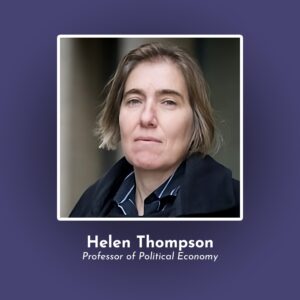
Show Summary
On this episode, political economist Helen Thompson and Nate discuss how energy and geopolitics have interconnected over the past century, building to the entangled political relationships we see around us today. The dynamics of power on a global scale are complex – stemming from access to energy, financial control, military strength, credibility/trust, and much more – yet we can understand these a bit better by learning the history that shaped them. How have geologic provinces of energy dense carbon created inherent hot spots on the geopolitical playing field? How has the global monetary system and debt evolved to strengthen the power of a select few countries and how difficult is it to break from this system? Do our leaders have the capability/knowledge to connect energy and geopolitical policy in order to guide us through a future of declining energy availability?
About Helen Thompson
Helen Thompson is Professor of Political Economy at Cambridge since 1994. Her current research concentrates on the political economy of energy and the long history of the democratic, economic, and geopolitical disruptions of the twenty-first century. She is a regular panelist on Talking Politics and a columnist for the New Statesman. She is a co-presenter of UnHerd’s podcast, These Times and recently published Disorder: Hard Times in the 21st Century.
In French, we have a motto that says that a simple drawing is often better than a long explanation. Jean-Marc Jancovici Carbone 4 President
That’s very understandable because with left atmosphere thinking, one of the problems is that you see everything as a series of problems that must have solutions. Iain McGilchrist Neuroscientist and Philosopher
We can’t have hundreds and hundreds of real relationships that are healthy because that requires time and effort and full attention and awareness of being in real relationship and conversation with the other human. Nate Hagens Director of ISEOF
This is the crux of the whole problem. Individual parts of nature are more valuable than the biocomplexity of nature. Thomas Crowther Founder Restor
Show Notes & Links to Learn More
Download transcript00:00 – Helen Thompson Works + Info, Disorder: Hard Times in the 21st Century
05:11 – BREXIT
06:07 – Representative Democracy
07:53 – 1970s political economy
09:05 – Oil and The Western Economic Crisis
09:50 – Suez Crisis
11:29 – British role in the Suez Canal 1956
12:55 – Eisenhower, Anthony Eden
13:33 – Strait of Tiran
13:55 – 1967 Egypt closing the Strait of Tiran for 8 years
16:38 – Iranian Revolution
17:07 – Azerbaijan number one exporter of oil to Israel, coming through Turkey
17:26 – Israel selling arms to Azerbaijan
18:15 – Abraham Accords
19:17 – Abraham Accords extended to Saudi Arabia
19:44 – Israel exporting gas, Jordan and Egypt
20:45 – Diplomatic rapprochement between Saudi Arabia and Iran, brokered by the Chinese
21:43 – Shia and Sunni Muslim sects
22:36 – Bush Administration negotiations in Iraq and Saudi Arabia post-Saddam era
24:10 – Palestine, Israel/Hamas Conflict
24:38 – ½-⅔ of the World’s oil is within 800 miles of Israel
25:55 – Trump maximum economic pressure in Iran
26:17 – Saudi defense system fail during Iranian attack
26:39 – Trump ordering assassination of Suleimani
27:34 – Strait of Hormuz
27:57 – American military presence in the Mediterranean
29:08 – Archduke Ferdinand
30:12 – Israel gas field production shut down, cutting off supply to Egypt
30:47 – Bush and the war in Iraq
33:39 – Shale Oil temporary and partial fix for US energy independence
34:27 – US Iranian sanctions, nuclear treaty deal
38:14 – Biden visit to Saudi Arabia in 2022, Saudi lack of cooperation on oil production
38:51 – UAE, Saudi Arabia, and BRICS+ account for 50% of oil exports available for purchase (analysis by ISEOF)
40:08 – OPEC+
40:28 – China constraints on foreign oil and gas dependency
41:05 – Russian/Saudi relations
41:31 – 2020, Mohammed bin Salman flooding oil market, Trump admin response
45:25 – Long Term Oil Futures
45:59 – George Floyd
48:12 – Strategic Petroleum Reserve, 180 million barrels of oil released in response to Russia
49:42 – ISIS, Iraqi citizen attacks on oil companies
52:34 – Germany/England use of coal since the 13th century
53:13 – Opium Wars
53:50 – Alsace-Lorraine
54:34 – Very minimal oil deposits in Europe
55:20 – World War I deciding access to oil in Imperialist Europe
1:03:23 – West Africa summer 2023, France getting uranium deposits
1:05:11 – Europe return to coal
1:07:08 – Petrodollar, dollar denominated debt
1:08:11 – Nixon ending gold standard
1:09:37 – Volcker Shock
1:13:13 – International Banking System, main support for dollar strength today
1:15:10 – Art Berman, TGS Episodes
1:15:15 – Putin Energy Phd
1:16:07 – Pipelines running through Ukraine
1:17:28 – Crimea Crisis
1:17:38 – Yanukovych
1:17:54 – Sevastopol
1:18:18 – Donbas, Ukrainian shale gas
1:18:45 – Poland Shale
1:20:15 – Biden removed sanctions on Nord Stream 2
1:25:27 – Johnson Administration
1:26:00 – Post-soviet Ukraine instability
1:27:05 – Dutch, Italian, and French long-term LNG contracts with Qatar
1:27:25 – Qatar relationship with Hamas
1:18:56 – German gas intensive production shut down Winter 2022
1:29:45 – Qatar and Iran relations
1:30:19 – UK past peak in energy production
1:32:59 – UK new naval base in Bahrain, relations with the UAE
1:46:48 – Lord of the Rings
1:55:18 – Origins of the gold standard







